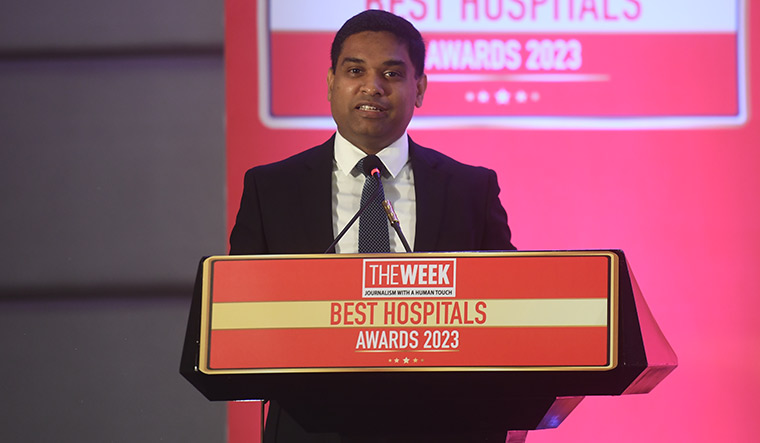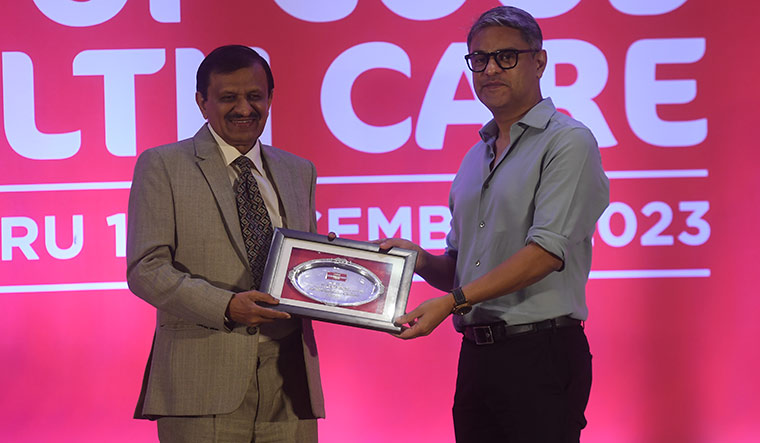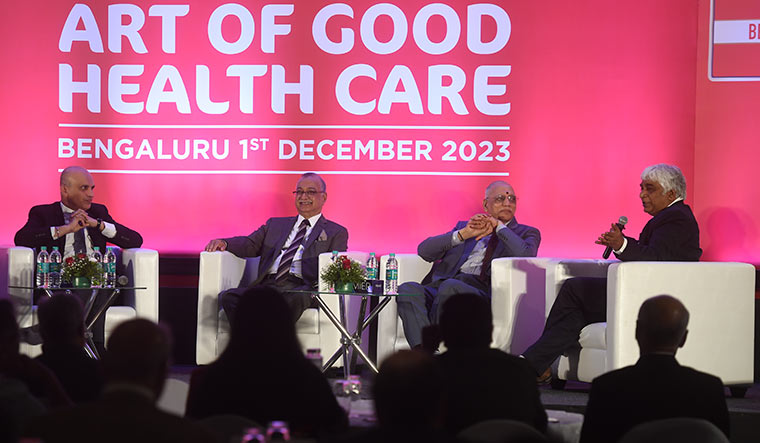TECHNOLOGY IS CHANGING how health care is being administered in India. The pandemic has accelerated the adoption of new ways to improve global health.
“When it (Covid-19) hit us, it was common to have video consultations and remote monitoring, as physical examination of patients was a problem. In hospitals, beds were restricted to people who required surgeries. There has been a huge impact in the field of radiology and [medical] imaging, which has taken a new turn due to technology. Monitoring devices have significantly reduced hospital deaths. [Today] we have to look at technology as our partner,” said Dr H. Sudarshan Ballal, chairman of the medical advisory board, and medical director, Manipal Hospital, during a panel discussion on the use of technology and Artificial Intelligence (AI) in health care at THE WEEK Best Hospitals Awards 2023 held in Bengaluru on December 1.
AI is making waves and is poised to transform medical sciences. Dr Sajan Nair, group COO, Zydus Hospitals & Healthcare Research Pvt Ltd, said there was a lot of automation in the hospital industry and doctors were adopting newer technologies. “In Gujarat, last year, we introduced the hub-and-spoke [distribution] model using AI for cerebral stroke. In laboratories we have middleware systems [that can boost laboratory performance]; we can get the results verified fast,” said Dr Nair.
 Antony Prashant (Deloitte India) | Bhanu Prakash Chandra
Antony Prashant (Deloitte India) | Bhanu Prakash Chandra
There is tremendous scope for the adoption of AI in cancer care, said Dr B.S. Srinath, senior consultant surgical oncologist, Shri Shankara Cancer Hospital & Research Centre. “Machine Learning [ML] methods can give accurate diagnosis and the hospital benefits. At the same time it is necessary to maintain the privacy of the data generated from AI and ML systems,” he said.
The role of technology in simplifying patient care was also discussed. Dr Santosh Shetty, CEO and executive director, Kokilaben Dhirubhai Ambani Hospital, Mumbai, said technology was helping in different ways to streamline systems in his hospital. He said automated technology systems helped in reducing the amount of blood collected from patients.
“Technology helps in reducing wastage. By using AI algorithms one is able to prioritise samples. At the same time we are able to give reports to patients much earlier than before,” said Dr Shetty.
 Chief associate editor and director, THE WEEK, Riyad Mathew, felicitating Dr C.N. Manjunath (Sri Jayadeva Institute of Cardiovascular Sciences and Research) | Bhanu Prakash Chandra
Chief associate editor and director, THE WEEK, Riyad Mathew, felicitating Dr C.N. Manjunath (Sri Jayadeva Institute of Cardiovascular Sciences and Research) | Bhanu Prakash Chandra
Dr C.N. Manjunath, director, Sri Jayadeva Institute of Cardiovascular Sciences and Research, Bengaluru, delivered the keynote address at the event. He spoke at length on health care in India. Dr Manjunath said there was a big jump in the number of medical colleges in India over the last five years. “Yet, there is maldistribution of medical colleges―40 per cent of the country’s population lives in south India and Maharashtra. And 60 per cent of medical colleges are located in these places. While 60 per cent of the Indian population lives in north India and the northeast, only 40 per cent of medical colleges are in these regions,” said Dr Manjunath.
The private medical sector remains the main source of health care for around 70 per cent of households in urban areas and for around 64 per cent of households in rural areas. “The need of the hour is to have well-trained and educated doctors; half-baked under-cooked, untrained doctors are harmful to the system,” he said.
The Central and state governments’ expenditure on health care is only 2.1 per cent of the GDP. “In contrast, the global average is around 9 per cent. Countries like Japan, France, Canada and Sri Lanka are spending more on health care. Also, doctors in rural areas are facing a lot of challenges―they face verbal and physical assault. Even in tier-2 and tier-3 cities, doctors face such problems. There needs to be a safe working environment for doctors. Doctors are ready to work in rural and semi-urban areas but there is no guarantee on their safety and security,” said Dr Manjunath.
Antony Prashant, partner, Deloitte India, said that AI would play an important role in remote monitoring. Citing the example of an organisation that does dialysis at home, Prashant said all their equipment were monitored from a command centre and could predict the health complications in a patient.
“There is even talk about implants that actually monitor one’s vitals on a day-to-day basis and diagnose any potential disruption. We may not have to visit any diagnostic lab. The patient of the future will be much empowered and equipped,” said Prashant.
Riyad Mathew, chief associate editor and director, THE WEEK, gave away the prizes to the best hospitals.


